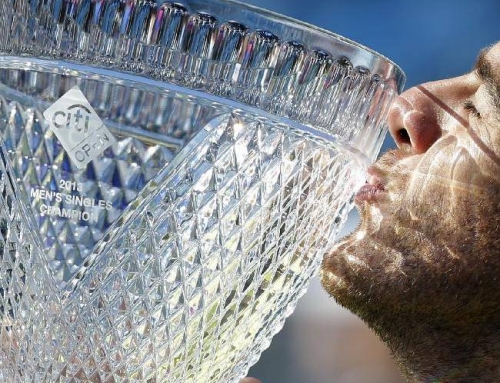Some players show remarkable dedication to their racquets, especially old school players. Pete Sampras stuck with the same racquet, the Wilson Pro Staff 85, his entire career. Stefan Edberg played with this racquet as well. Boris Becker played with a single racquet his entire career. When the racquet was to be discontinued, he acquired all the racquets and the company itself. While these seem like extreme devotion, many would argue that pros must be comfortable with their racquets (although beginners often think pros should be able to play with any racquet, not realizing that pros expect more out of their racquet than beginners do).
Some players aren’t nearly as picky. Andre Agassi started off with a Prince, then switched to a Donnay (winning a Wimbledon with that racquet), then switched to Head and played with a Head the rest of his career. Some players struggled, but adjusted. Novak Djokovic used a Wilson, but switched to a Head. He had problems with the racquet for about 6 months, potentially losing at a Slam while he made the adjustment.
All of this may have to do with confidence, and being familiar with the change.
Back in late 2009, Nikolay Davydenko, who had been a solid top ten player, hit a peak in his career. He beat Nadal and Djokovic during the Asian swing, then won the year-end championship beating Federer and del Potro en route to the title. He continued his good play, and really had Federer on the ropes at the Australian Open in 2010, before collapsing. Davydenko, whose bald top and bland personality, was not exactly swimming in endorsements. Even players ranked lower than him, say, Gael Monfils, did better because his personality shined more.
After this stretch of good play, Davydenko signed a deal with Dunlop which dressed him head-to-toe. He was to switch racquets from his Prince, which he claimed helped him play his best tennis, to a Dunlop. However, Davydenko got injured in 2010. He had to drop out of Indian Wells when he realized his left wrist was broken. Davydenko returned around Wimbledon that year, but played poorly throughout the rest of 2010 and all of 2011. He wasn’t so bad that he couldn’t win a tournament, but he did play badly enough to drop out of the top ten.
Throughout this year and a half, he kept fiddling with his racquet, hoping to find the right combination of weight that would make him feel happy. Apparently, he (or Dunlop) gave up on this experiment.
By the time Davydenko played Rotterdam, he has a different clothing contract (with Asics) and has gone back to playing Prince (does he even have a contract with them?). Clearly, the change has been positive for his game as he reached the semis of Rotterdam and finally played a reasonably good match against Federer. He’s not quite to the way he played in 2009, but there’s more confidence in his hitting, and it goes to show that, for some players, tinkering with success for more money is detrimental for a career. Davydenko may never get the glamorous contracts that his fellow players have, but he can at least play good tennis.
Getting back to tennis. Davydenko is one of those players that Federer used to own. Despite being the heir apparent (and hair apparent) to Andre Agassi, Davydenko struggled badly against Federer, probably due to the lack of a big serve. Davydenko’s strengths are playing tight to the baseline and using the angles to his advantage. Honestly, Fed likes to play a similar style, but has a bit more variety. In 2009, Davydenko improved both his serve and his confidence, and finally beat Federer a few times, before his game spiraled out of control.
In this match, Davydenko started off well, taking the first set, but Federer came back to take the second set. Fed had many chances to break early in the third set, but Davydenko kept fighting back. Davydenko also had chances to break Federer, but couldn’t manage to do it either. Eventually, Davydenko had his serve broken at love and Federer was able to serve out the match.
Earlier in the day, Juan Martin del Potro easily won his match over Tomas Berdych. This will be the first interesting match in 2012 since the Australian Open. Federer was on a losing streak at Davis Cup despite playing very solid tennis up to the end of 2011. del Potro felt his game was about ready to go, but couldn’t make it deep in Melbourne. This match probably means a bit more to Federer than del Potro. Clearly, del Potro wants to win, but Federer wants to prove to himself that his game isn’t in decline, and a win would really help his confidence, more than a loss would hurt Delpo’s confidence.



![[Basel] del Potro wins Basel over Federer for second consecutive year](https://www.essentialtennis.com/wp-content/uploads/2013/10/20131028delpo-500x383.jpg)


